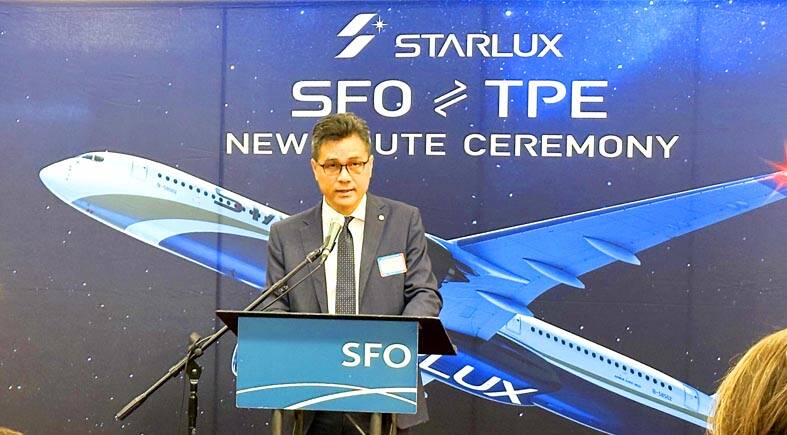Starlux Airlines Co (星宇航空) is to lease six A321neo aircraft as it eyes expansion amid a tourism boom.
The airline plans to spend about NT$2.16 billion (US$67.51 million) on each of the first three planes, which would be leased from GY Aviation Lease 2405 Co, Starlux said in a statement.
The price of the other three planes is still being negotiated and would be disclosed after an agreement is signed, it said.

Photo: CNA
A Starlux prospectus posted in June on the Taiwan Stock Exchange said that as of the end of May, the airline had a fleet of 22 passenger planes — 13 A321neos, five A350-900s and four A330neos.
The airline is expected to take delivery of an additional five planes by the end of this year to boost its fleet to 27, the prospectus said.
The airline would introduce its first A350-1000 aircraft next year to serve long-haul routes to the US, it said.
Starlux launched direct flights between Taipei and Seattle on Friday. The airline also flies to Los Angeles and San Francisco in the US, which are among more than 20 destinations overall, including Vietnam, the Philippines, Malaysia, Singapore, Thailand, Japan and Hong Kong.
On Oct. 27, the airline is to launch daily flights between Taichung and Phu Quoc Island in Vietnam on its A321neo planes.
Next month, it is to begin five weekly flights between Taipei and Jakarta, also on the A321neos.
With a resurgence in tourism following the end of COVID-19 restrictions, Starlux posted NT$900 million in net profit in the first half of this year, up 172 percent from a year earlier. Earnings per share were NT$0.39 in the period, up NT$0.21 from a year earlier.
The carrier’s consolidated sales for the first six months surged 65 percent from a year earlier to NT$16.33 billion.
Last month, Starlux posted NT$3.47 billion in consolidated sales, up 53 percent from a year earlier and 13 percent from a month earlier to set a new high for the month.
Revenue from its passenger flight operations was about NT$3.03 billion last month and the company posted NT$301 million in sales from its cargo flights, up 122 percent from a year earlier, largely due to demand for transportation of gadgets related to an artificial intelligence boom.
At an annual meeting in June, Starlux chairman Chang Kuo-wei (張國煒) said that the carrier aimed to eliminate its cumulative losses of more than NT$11.5 billion in three years.

SEMICONDUCTORS: The German laser and plasma generator company will expand its local services as its specialized offerings support Taiwan’s semiconductor industries Trumpf SE + Co KG, a global leader in supplying laser technology and plasma generators used in chip production, is expanding its investments in Taiwan in an effort to deeply integrate into the global semiconductor supply chain in the pursuit of growth. The company, headquartered in Ditzingen, Germany, has invested significantly in a newly inaugurated regional technical center for plasma generators in Taoyuan, its latest expansion in Taiwan after being engaged in various industries for more than 25 years. The center, the first of its kind Trumpf built outside Germany, aims to serve customers from Taiwan, Japan, Southeast Asia and South Korea,

Gasoline and diesel prices at domestic fuel stations are to fall NT$0.2 per liter this week, down for a second consecutive week, CPC Corp, Taiwan (台灣中油) and Formosa Petrochemical Corp (台塑石化) announced yesterday. Effective today, gasoline prices at CPC and Formosa stations are to drop to NT$26.4, NT$27.9 and NT$29.9 per liter for 92, 95 and 98-octane unleaded gasoline respectively, the companies said in separate statements. The price of premium diesel is to fall to NT$24.8 per liter at CPC stations and NT$24.6 at Formosa pumps, they said. The price adjustments came even as international crude oil prices rose last week, as traders

Taiwan Semiconductor Manufacturing Co (TSMC, 台積電), which supplies advanced chips to Nvidia Corp and Apple Inc, yesterday reported NT$1.046 trillion (US$33.1 billion) in revenue for last quarter, driven by constantly strong demand for artificial intelligence (AI) chips, falling in the upper end of its forecast. Based on TSMC’s financial guidance, revenue would expand about 22 percent sequentially to the range from US$32.2 billion to US$33.4 billion during the final quarter of 2024, it told investors in October last year. Last year in total, revenue jumped 31.61 percent to NT$3.81 trillion, compared with NT$2.89 trillion generated in the year before, according to

PRECEDENTED TIMES: In news that surely does not shock, AI and tech exports drove a banner for exports last year as Taiwan’s economic growth experienced a flood tide Taiwan’s exports delivered a blockbuster finish to last year with last month’s shipments rising at the second-highest pace on record as demand for artificial intelligence (AI) hardware and advanced computing remained strong, the Ministry of Finance said yesterday. Exports surged 43.4 percent from a year earlier to US$62.48 billion last month, extending growth to 26 consecutive months. Imports climbed 14.9 percent to US$43.04 billion, the second-highest monthly level historically, resulting in a trade surplus of US$19.43 billion — more than double that of the year before. Department of Statistics Director-General Beatrice Tsai (蔡美娜) described the performance as “surprisingly outstanding,” forecasting export growth